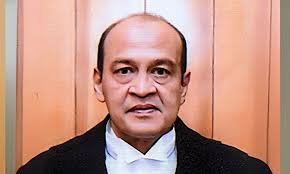
The Supreme Court on Wednesday refused an urgent hearing of a petition seeking the registration of a First Information Report (FIR) and an investigation into the alleged discovery of unaccounted cash at the official residence of Delhi High Court Judge Yashwant Varma. Chief Justice of India (CJI) Sanjiv Khanna directed the petitioner to follow due process and submit a formal request outlining the urgency of the matter.
Petition Questions Delayed Legal Action
Advocate Mathews J Nedumpara, who filed the plea, sought an expedited listing, but CJI Khanna refused to entertain his oral request. Instead, the CJI advised him to submit an email explaining the urgency. Co-petitioner advocate Hemali Suresh Kurne argued that law enforcement agencies would have acted swiftly if an ordinary citizen was involved, questioning the alleged preferential treatment for a sitting judge.
The plea, filed before the apex court on Monday, calls for the Delhi Police to register an FIR and conduct a thorough probe into the alleged cash recovery at Justice Varma’s residence on March 14. The money was reportedly discovered after fire brigade officials responded to a fire at his bungalow while he was in Bhopal.
The petition raises concerns over the delay in reporting the discovery, suggesting a possible cover-up. It questions why no arrests were made, why the money was not seized, and why a formal recovery memo was not prepared. “Why was criminal law not set into motion?” the plea asks.
Justice Varma Denies Allegations
Justice Yashwant Varma has denied any involvement with the alleged cash, claiming that he is being framed in a conspiracy to malign him. The petition, however, argues that if he was not responsible, he should have immediately reported the incident and sought an FIR against those attempting to falsely implicate him.
Calling the case an “open and shut” instance of judicial corruption, the plea suggests that the presence of unaccounted cash indicates black money linked to the “sale of justice.” It also challenges the Supreme Court’s 1991 ruling in K Veeraswami vs. Union of India, which requires the CJI’s approval before registering a criminal case against a high court or Supreme Court judge. The petition claims this creates an “exclusive class of judges immune from the penal laws of the land.”
SC Appoints Inquiry Panel, Transfers Case
On March 24, CJI Khanna constituted a three-member in-house inquiry panel to investigate the allegations. The panel includes:
- Justice Sheel Nagu (Chief Justice, Punjab & Haryana High Court)
- Justice GS Sandhawalia (Chief Justice, Himachal Pradesh High Court)
- Justice Anu Sivaraman (Karnataka High Court)
As part of the inquiry, the Chief Justice of the Delhi High Court has been directed not to assign any judicial work to Justice Varma. The decision followed a recommendation by Delhi High Court Chief Justice Devendra Kumar Upadhyaya, who reviewed a preliminary report and suggested an in-house probe.
The controversy stems from a fire incident at Justice Varma’s residence on Tughlak Road on March 14 at around 11:35 PM. While fire department officials quickly doused the fire, reports emerged that first responders—including fire services personnel and possibly police officers—discovered large stacks of cash in a storeroom, some of which were allegedly charred. Justice Varma and his wife were not at home at the time.
Resistance to Varma’s Transfer
On March 20, the Supreme Court collegium recommended transferring Justice Varma to the Allahabad High Court—his parent court. However, some members of the collegium argued that a mere transfer was insufficient and called for an immediate investigation.
The transfer decision has sparked backlash from the Allahabad High Court Bar Association (HCBA), which has opposed Justice Varma’s posting and called for his impeachment. “The lawyers of the Allahabad High Court Bar Association will go on an indefinite strike from Tuesday in protest against Justice Yashwant Varma’s transfer,” HCBA chief Anil Tiwari told news agency PTI.
Political Repercussions and Parliamentary Debate
The controversy has reached Parliament, with opposition leaders raising concerns over judicial accountability. On March 21, Congress MP Jairam Ramesh highlighted the issue in the Rajya Sabha, prompting Chairman Jagdeep Dhankhar to state that he would explore structured discussions on the judiciary’s role. Dhankhar later held a meeting with BJP leader JP Nadda and Congress leader Mallikarjun Kharge, where he praised CJI Khanna for handling the matter in a “transparent and impactful manner.”
As the case unfolds, questions persist over the legal process, judicial independence, and the implications of Justice Varma’s transfer. The Supreme Court’s internal inquiry and the demand for criminal investigation continue to fuel debates about accountability in the higher judiciary.
Sources By Agencies

